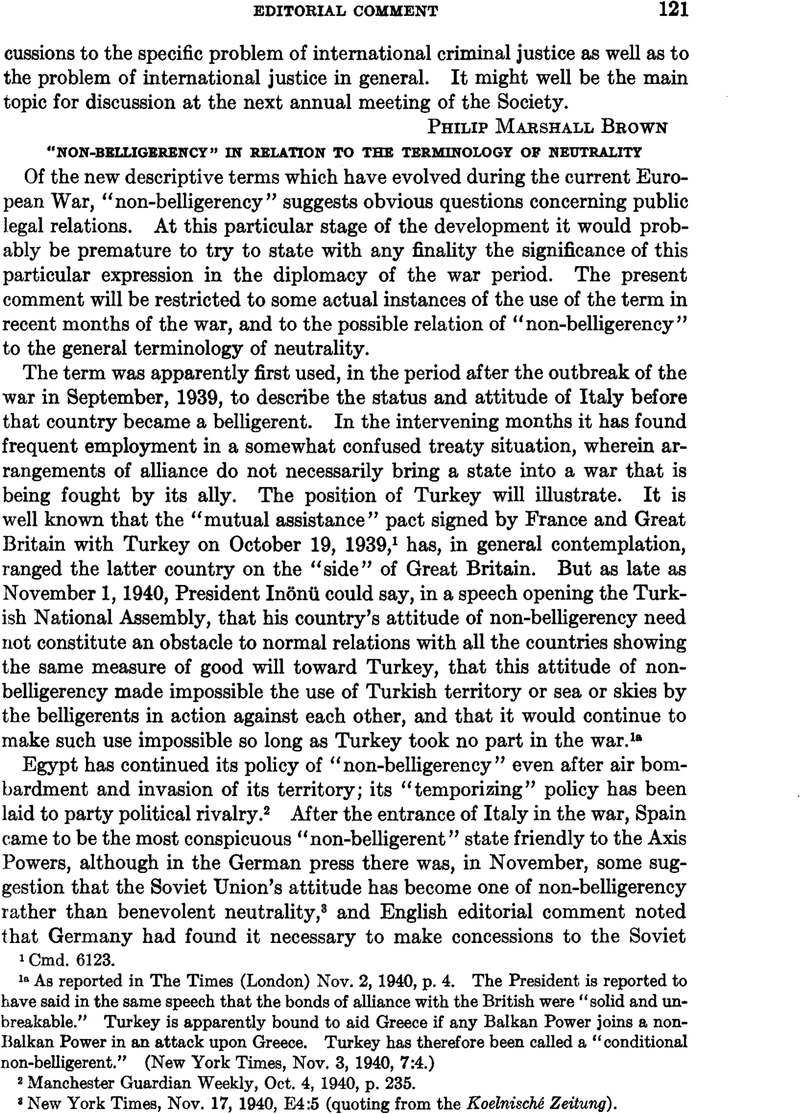Published online by Cambridge University Press: 12 April 2017

1 Cmd. 6123.
1a As reported in The Times (London) Nov. 2, 1940, p. 4. The President is reported to have said in the same speech that the bonds of alliance with the British were “solid and unbreakable.” Turkey is apparently bound to aid Greece if any Balkan Power joins a non-Balkan Power in an attack upon Greece. Turkey has therefore been called a “conditional non-belligerent.” (New York Times, Nov. 3, 1940, 7:4.)
2 Manchester Guardian Weekly, Oct. 4, 1940, p. 235.
3 New York Times, Nov. 17, 1940, E4:5 (quoting from the Koelnisché Zeitung).
4 The Times (London), Nov. 13, 1940, p. 4.
5 Reported remarks of Virginio Gayda in the Voce d’Italia, New York Times, Nov. 25, 1940, p. 3.
It was reported from Switzerland that Bulgaria and Germany might sign some kind of agreement defining the difference between “neutrality” and “non-belligerency” toward Germany. (Idem.)
6 British Weekly, Oct. 31, 1940, p. 41.
7 The Times (London), Nov. 9,1940, p. 3, reproducing in part an article from the Diario da Manha. In the same article General Franco was reported to be in agreement with Portugal on the localization of the war.
8 Dublin Evening Mail (editorial), Oct. 28, 1940, p. 4. See also an earlier editorial statement (ibid., July 1, 1940, p. 2): “We have striven anxiously and scrupulously to maintain the neutrality that our Government declared at the outset, and we have maintained it successfully; but it would be folly indeed to imagine that our neutrality alone could save us from attack if it suited the purpose of one of the belligerent countries to attempt to make a battleground here. . .”
9 As stated by Herbert W. Briggs, this Journal, Vol. 34 (1940), p. 569n.
10 The Times (London), Sept. 4,1940, p. 5 (editorial). See also the statement that the Nazi war on the neutrals was not a mere incident dictated by military exigencies, but an essential part of the plan. (Ibid., Sept. 2, 1940, p. 5.)
11 Dana’s Wheaton (1866), pp. 509,510. As to a neutral’s furnishing one of the belligerents with needed materials, under preëxisting treaties, the conclusion offered, with supporting references to Bynkershoek and Vattel, was that “The fulfillment of such an obligation does not necessarily forfeit his neutral character, nor render him the enemy of the other belligerent nation, because it does not render him the general associate of its enemy.” (Ibid., p. 517.)